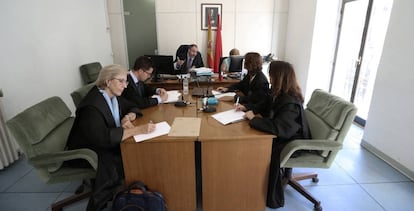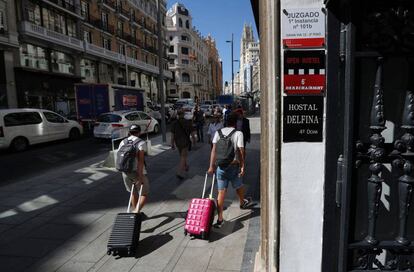Why Spain’s special courts for abusive mortgages are swamped
They were set up to avoid clogging the regular system, but banks are systematically appealing each and every ruling


The story told by 42-year-old nurse Concepción Gómez begins like many others. “Someone I know recommended…” But the advice was nothing as simple as an effective cold cure, or the coolest band on the music scene. Instead it was a mortgage for the apartment that she and her husband were about to buy.
Of the 260,000 cases filed so far, barely 52,000 have concluded – that’s two in every 10
It was 2008, just before the financial crisis broke, and banks were selling foreign currency mortgages: loans taken out in a currency other than euros and aimed at taking advantage of low interest rates abroad. “I didn’t understand any of it, and they didn’t explain it to me,” she says. But she trusted the advice. A few signatures later, her domestic finances were at the mercy of the fluctuations of the international money markets.
The repayments on her mortgage, which was denominated in Swiss francs, soon began to shoot up. In 2016 she filed a lawsuit against her lender, Spain’s Bankinter. Ten months later, she won the case.

Today, that kind of swift process would be unthinkable. Last year, after the European justice system ruled that banks must repay all of the excess interest charged via so-called “floor clauses” – which set a minimum interest rate borrowers have to repay on mortgages, even if the benchmark rate drops below it – a total of 54 special courts were created in Spain. With one for every province on the peninsula and two each in the Balearic and Canary Islands, they were designed to cope with the flood of lawsuits from people who had paid too much to the bank.
Of the 260,000 cases filed so far, barely 52,000 have concluded – that’s two in every 10. The special courts can’t cope. People say they are waiting up to a year just for their cases to be admitted, and this has been confirmed by the judges, lawyers and civil servants who are dealing with the cases.
The couple borrowed €210,000 for the mortgage. After 10 years of repayments, their debt is currently at €258,000
Added to this backlog is a growing delay in the country’s appellate courts because lenders, despite losing 97% of cases, are challenging all of the rulings and creating a second bottleneck.
The ruling in Concepción Gomez’s case stated that the bank was not transparent and that the couple lacked the financial knowledge to be aware of the risks of what they were signing themselves into. That’s why Bankinter was instructed to cancel the mortgage and recalculate their debt in euros. But the bank appealed, and the family is still having to shell out “huge repayments.” “My husband was without work for several months and we had a very bad time,” she explains. “Luckily I am a civil servant.”
The couple borrowed €210,000 for the mortgage. After 10 years of repayments, their debt is currently €258,000. Their case will now be heard at the Madrid High Court. “I’m told there are between two- and four-year waiting times,” she says with a sigh.
Overload

Gerardo Martínez, a member of Spain’s CGPJ legal watchdog and the coordinator of the special courts, doesn’t believe that the situation could be described as gridlock, but rather a “concentration” of issues.
In contrast to some judge associations who criticize the decision to create special courts, Martínez believes that it would have been much worse to share the cases out among already overloaded courtrooms, ones that are dealing with “very important [issues], such as bankruptcies where thousands of jobs are at risk.” “We did it like this to avoid the breakdown of the entire civil legal system,” argues Martínez, listing what he views as the advantages of the plan: “Efficiency in terms of resources and greater juridical security because the sentences are more uniform.”
“The system has not been efficient,” counters Celso Rodríguez, spokesperson for the judge association APM. “It has caused a complete bottleneck. It’s not possible to respond within a reasonable time frame. There are thousands upon thousands of lawsuits still to be initiated in Madrid.” Sharing them out among all the courts would “lessen the effect.”
It’s not possible to respond within a reasonable time frame. There are thousands upon thousands of lawsuits still to be initiated in Madrid Celso Rodríguez, spokesperson for judge association APM
“Silence” read the signs outside a Madrid courtroom, numbered 101 bis, and specializing in cases involving abusive mortgage clauses. The two dozen or so lawyers milling around outside pay no heed, chatting away while they wait their turn. A screen shows the day’s timetable. There is a hearing every 10 minutes in each one of the five courtrooms – almost the same as in a doctor’s office.
In 80% of cases, the plaintiff doesn’t even need to turn up in court. Most of the cases are settled in a preliminary hearing between the legal representatives of the plaintiff and those representing the bank. They don’t go to trial. “Cases involving banks are all about paperwork,” explains one judge. “Procedural issues are settled and then a judgment is ready to be entered.”
The hearings last three minutes. Some last five, should there be minor discrepancies to clear up. They involve floor clauses or mortgage costs, and in some cases a group of lawsuits against the same bank is heard at the same time, so that the lawyers don’t even need to leave their seats as they move from hearing to hearing. “It’s all very streamlined,” says one bank lawyer on his way out.
In the more complicated cases, such as the currency mortgages, there is a full trial, and the plaintiffs and witnesses have to appear in court. These can take nearly an hour. In total, the 10 judges in the 101 bis courtrooms have a thousand hearings a month – which is 100 per judge. And even at that rate they can’t keep up.
The surprising thing about courtroom 101 bis is the lack of piles of documents – particularly when considering that in just over a year, more than 25,000 lawsuits have arrived. “You won’t see judges coming and going here with a briefcase in tow,” says Juan Carlos Conde, the court clerk who coordinates the judicial office. “If this were a normal courtroom, we wouldn’t be able to fit due to all the paper.”
All of the files in this courtroom are digital. The judges don’t have their own offices, and usually work at home with laptops connected to the system. “This is the only paperless court in Spain,” explains the head of the Madrid High Court, Francisco Vieira, who sees the creation of this special tribunal as an opportunity to test a more modern style of judicial office.
Whether they’re hard copies or in digital format, new lawsuits continue to pour into 101 bis – more than 5,000 in the second quarter of the year. Many of those that are closed end up going to a second hearing, because, as the lawyer Jesús Ruiz de Arriaga explains, the banks “appeal everything.”
“The game for them is, ‘I’m going to lose all of these cases, but with this system I am discouraging citizens from filing a claim.’ You have to take into account that in many cases these are small amounts, €1,500 or €2,000, if we are talking about mortgage costs. But for the banks, put together they come to several billion euros. At Arriaga we have already recovered more than €900 million,” he adds.
The head of the Murcia High Court, Miguel Pasqual de Riquelme, has a clear concept of who is to blame for the backlog. He recently stated that he believes that the banks are “unjustifiably hobbling” the system with an “artificial litigiousness that could easily be avoided, and which is consuming huge amounts of public resources,” because they are not negotiating out of court with clients in cases in which the tribunals have already set out the criteria. And they are doing so, he added, after having benefited from the “huge public subsidies paid out to overcome the financial crisis.”
English version by Simon Hunter.
Tu suscripción se está usando en otro dispositivo
¿Quieres añadir otro usuario a tu suscripción?
Si continúas leyendo en este dispositivo, no se podrá leer en el otro.
FlechaTu suscripción se está usando en otro dispositivo y solo puedes acceder a EL PAÍS desde un dispositivo a la vez.
Si quieres compartir tu cuenta, cambia tu suscripción a la modalidad Premium, así podrás añadir otro usuario. Cada uno accederá con su propia cuenta de email, lo que os permitirá personalizar vuestra experiencia en EL PAÍS.
¿Tienes una suscripción de empresa? Accede aquí para contratar más cuentas.
En el caso de no saber quién está usando tu cuenta, te recomendamos cambiar tu contraseña aquí.
Si decides continuar compartiendo tu cuenta, este mensaje se mostrará en tu dispositivo y en el de la otra persona que está usando tu cuenta de forma indefinida, afectando a tu experiencia de lectura. Puedes consultar aquí los términos y condiciones de la suscripción digital.








































